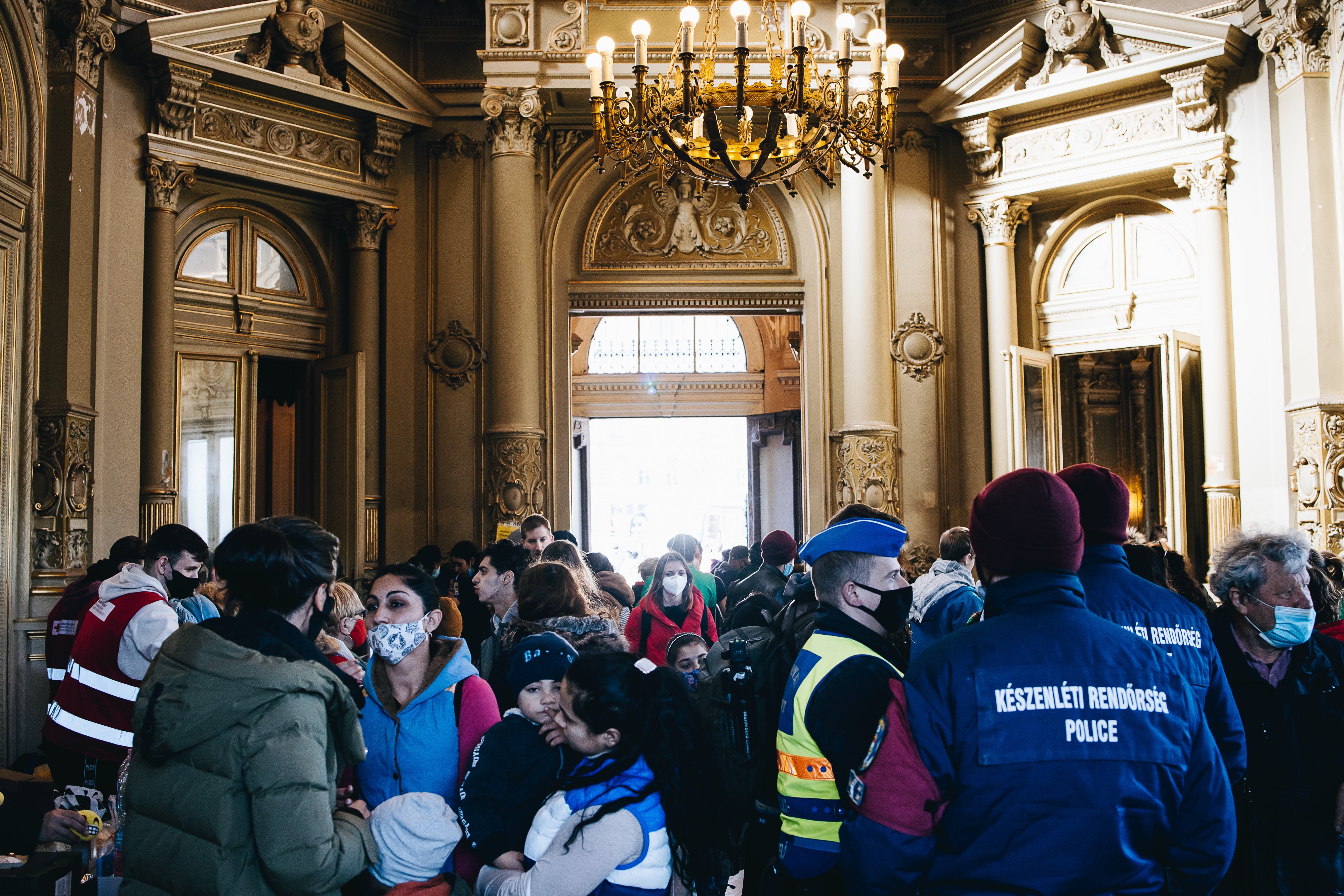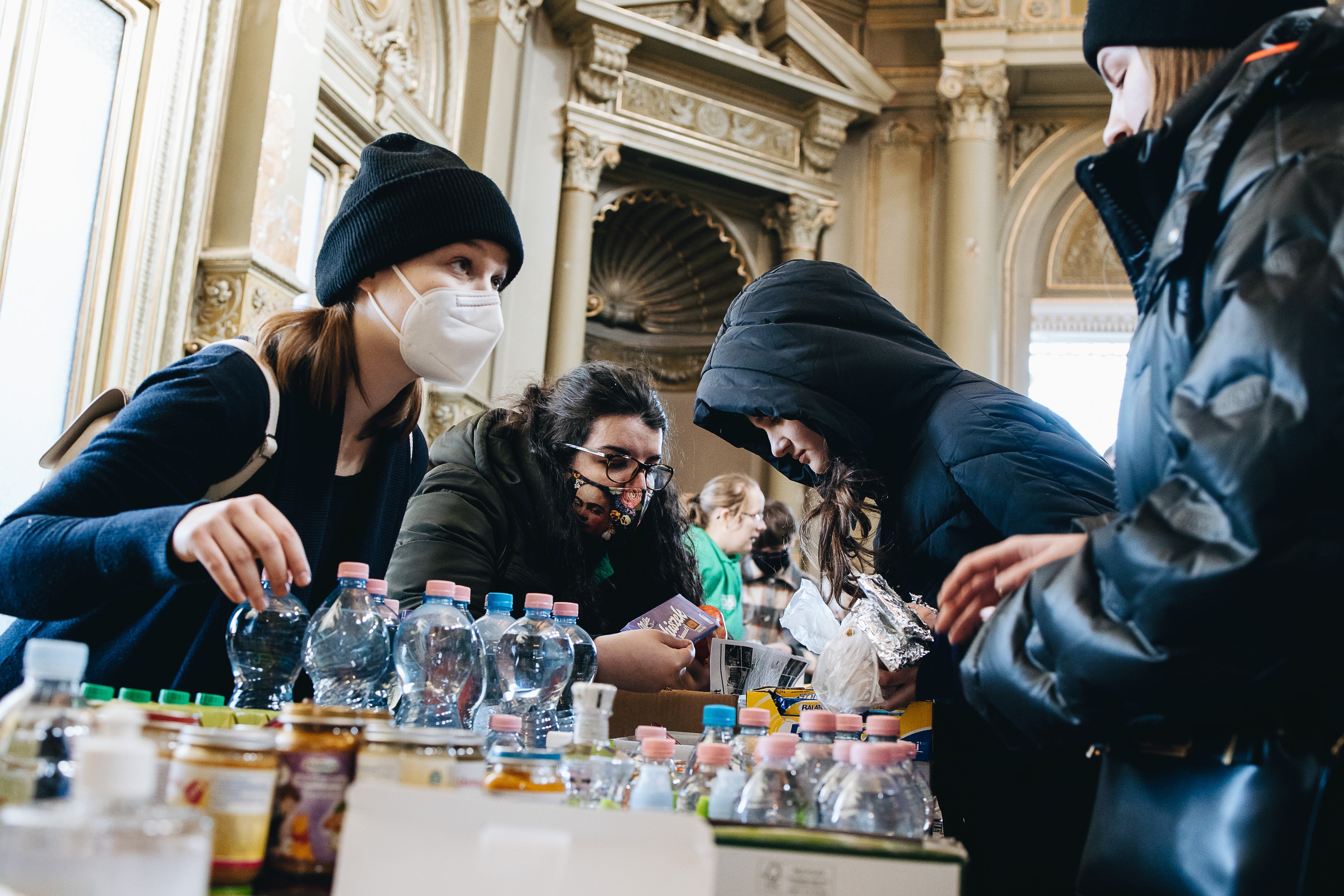‘My goal was to not die’: Ukrainian refugees flee to Hungary as Russia’s war worsens
Refugees Welcome: More than 80,000 people have fled from Ukraine to Hungary, where Budapest’s Nyugati railway station is serving as a humanitarian relief hub for refugees, reports Borzou Daragahi
Your support helps us to tell the story
From reproductive rights to climate change to Big Tech, The Independent is on the ground when the story is developing. Whether it's investigating the financials of Elon Musk's pro-Trump PAC or producing our latest documentary, 'The A Word', which shines a light on the American women fighting for reproductive rights, we know how important it is to parse out the facts from the messaging.
At such a critical moment in US history, we need reporters on the ground. Your donation allows us to keep sending journalists to speak to both sides of the story.
The Independent is trusted by Americans across the entire political spectrum. And unlike many other quality news outlets, we choose not to lock Americans out of our reporting and analysis with paywalls. We believe quality journalism should be available to everyone, paid for by those who can afford it.
Your support makes all the difference.On the third day of the war, the bombing became overbearing, and Vera Rudova concluded it was time to leave Kyiv, the city where she had lived her entire life.
“It was my last chance to get out,” she said.
The 31-year-old Ukrainian stylist boarded what she said was the final train out of Kyiv and made her way from station to station in the vast Ukrainian countryside, squeezing her way onto trains first toward Lviv and the Polish border, and then toward the Hungarian frontier before she finally arrived in Budapest on Tuesday afternoon.

“My goal was just not to die and be safe,” she told The Independent, as she rested outside Budapest’s Nyugati station, which has turned into a makeshift humanitarian relief hub for thousands of Ukrainians and others escaping Russia’s invasion.
The ornate train station, built in the 19th century by the same company that built the Eiffel Tower in Paris and considered an architectural masterpiece, is now the centre of efforts by Hungarian authorities, relief organisations and good samaritans to help at least 80,000 Ukrainian citizens and residents who have fled the conflict.
The government of the controversial prime minister Viktor Orban, who has frequently demonised migrants and refugees from the Middle East, has thrown open its doors to those escaping the Ukraine war and set up a national helpline to coordinate efforts and direct aid – earning praise even from opponents.
The Independent has set up a petition calling on the UK government to be at the forefront of the international community offering aid and support to those in Ukraine. To sign the petition click here.
The Independent is also raising money for the people of Ukraine – if you would like to donate then please click here for our GoFundMe page.
“We appreciate what he’s doing to help refugees,” Peter Marki-Zay, leader of the opposition, said to journalists. Opponents, though, were organising a rally Tuesday to oppose Mr Orban’s close association with Russian president Vladimir Putin and muster up donations for refugees.
More than half a million refugees have already fled Ukraine, heading toward Poland, Romania, and Moldova as well as Hungary, with the UN warning that the figure could ultimately exceed 4 million and lead to “Europe’s largest refugee crisis this century”.
Every few hours, trains arriving from eastern Hungary disgorge hundreds of passengers, many of them families with children. Bewildered and exhausted, they are guided into an elegant hall surrounded by statues of Hungarian historical figures and elaborate terracotta trimmings where volunteers offer food, snacks, medicine, toiletries, toys, and information about lodging options.
A pair of women brought homemade sandwiches they had prepared. Another woman brought brownies she’d baked. Several people held up signs offering translation services.
“We are giving out a couple of things, along with a hug if you need,” read one sign.

“We need sandwiches more than anything,” said Natalie Montanaro, an American living in Hungary who decided to volunteer for the Red Cross effort. “We need water and fruit. We have food, but few ways to package it. ”
One volunteer, 27-year-old Viktoria, is a Russian living in Budapest. She came to offer her to translate for the arrivals, many of whom don’t speak any other languages but Ukrainian or Russian. She said she was opposed to Vladimir Putin’s war, and felt powerless to stop it. “I think it’s horrible,” she said, “My father wanted to go out and protest, but was afraid he would get fired.”
Most of the arrivals are Ukrainians, and many are ethnic Hungarians with strong ties to this country. But there are people from other nations as well, students and labourers from the Middle East, Africa and South Asia who found themselves in Ukraine as the war began.
Even those with means find themselves in a tough situation, in a country they never expected to visit, with few of their belongings and little
“Even if they have money, perhaps they couldn’t access it because banks were closed or couldn’t exchange it,” said Reka Gilizce, a spokesperson for a Protestant charity.

Tomi, a 19,-year-old Nigerian, tried to stay on in the eastern Ukrainian city of Kharkiv as long as she could.
But as the bombing intensified, shaking even the subway station where she had been sheltering, she and her friends made a decision to leave Ukraine’s second-largest city and one of the main targets of Mr Putin’s effort to conquer the country.
They grabbed a few bags and pushed their way onto trains. Plan A was to head to Poland, but they were repeatedly told they would have problems crossing the border.
“We heard they weren’t accepting foreigners in Poland, only Ukrainians,” she said.
So they decided to make their way toward the Hungarian border. On Monday, she waited 11 hours in the bitter cold before being able to cross the frontier, eventually arriving in Budapest. She grabbed some food and secured a toothbrush and toothpaste. She said she just wanted to find a hotel and take a hot bath, then confer with her family and friends about where to go next.
“After sleeping I will be able to think about my next move,” she said.
The Independent has a proud history of campaigning for the rights of the most vulnerable, and we first ran our Refugees Welcome campaign during the war in Syria in 2015. Now, as we renew our campaign and launch this petition in the wake of the unfolding Ukrainian crisis, we are calling on the government to go further and faster to ensure help is delivered. To find out more about our Refugees Welcome campaign, click here.






Join our commenting forum
Join thought-provoking conversations, follow other Independent readers and see their replies
Comments